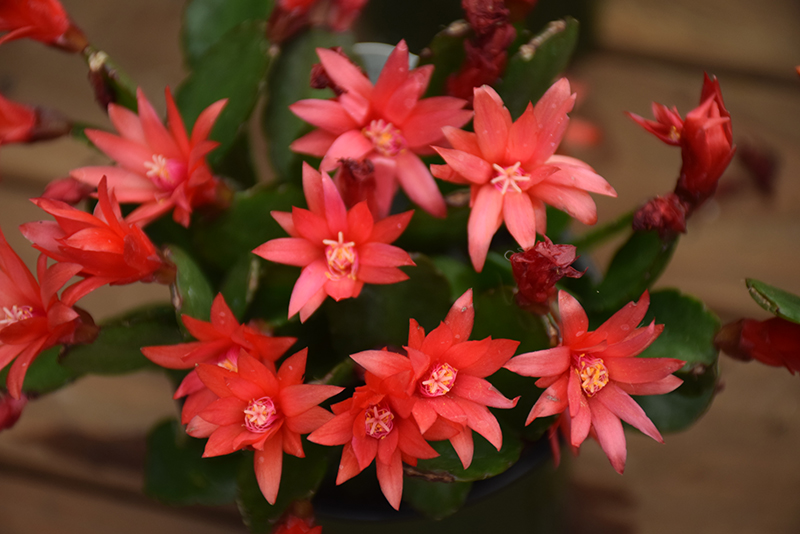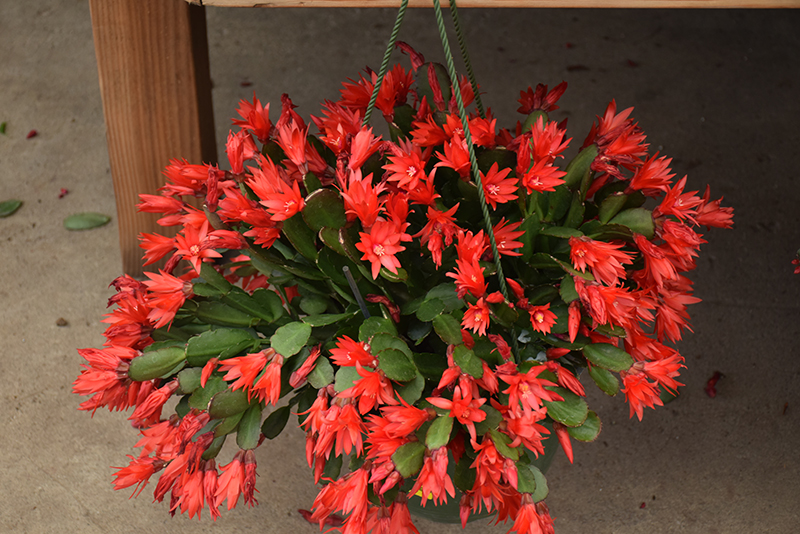Height: 10 inches
Spread: 24 inches
Sunlight:
![]()
![]()
Other Names: Hatiora gaertneri, Schlumbergera gaertneri
Description:
A stunning container or basket plant that produces gorgeous blooms in a variety of colors, in winter or early spring; easy to care for; locate in a bright indoor area
Features & Attributes
Easter Cactus is a small succulent evergreen plant. It is an atypical member of the cactus family known as an 'epiphyte' or 'air plant', which means that it doesn't necessarily require a growing medium for its roots. Like all other cacti, it doesn't actually have leaves, but rather modified succulent stems that comprise the bulk of the plant. This particular variety of cactus is valued for its distinctively arching form on a plant consisting of smooth dark green segmented pads that typically form 'branches' which will grow outwards and even spill over the edges of containers. This plant is draped in stunning scarlet daisy flowers with orange overtones at the ends of the stems from mid winter to early spring.
Planting & Growing
When grown indoors, Easter Cactus can be expected to grow to be about 10 inches tall at maturity, with a spread of 24 inches. It grows at a slow rate, and under ideal conditions can be expected to live for approximately 10 years. This houseplant will do well in a location that gets either direct or indirect sunlight, although it will usually require a more brightly-lit environment than what artificial indoor lighting alone can provide. This is a unique plant in that it requires extremely dry, well-drained soil, and it will die if left in standing water for any length of time - in fact it will suffer if it is over-watered. The soil should be allowed to go completely dry to the touch an inch or two deep for prolonged periods, and it may only need watering once every few weeks. Be aware that your particular watering schedule may vary depending on its location in the room, the pot size, plant size and other conditions; if in doubt, ask one of our experts in the store for advice. Like most succulents and cacti, it prefers to grow in poor soils and should therefore never be fertilized. It is not particular as to soil pH, but grows best in sandy soil. Contact the store for specific recommendations on pre-mixed potting soil for this plant.
There are many factors that will affect the ultimate height, spread and overall performance of a plant when grown indoors; among them, the size of the pot it's growing in, the amount of light it receives, watering frequency, the pruning regimen and repotting schedule. Use the information described here as a guideline only; individual performance can and will vary. Please contact the store to speak with one of our experts if you are interested in further details concerning recommendations on pot size, watering, pruning, repotting, etc.
-- THIS IS A HOUSEPLANT AND IS NOT MEANT TO SURVIVE THE WINTER OUTDOORS IN OUR CLIMATE --

